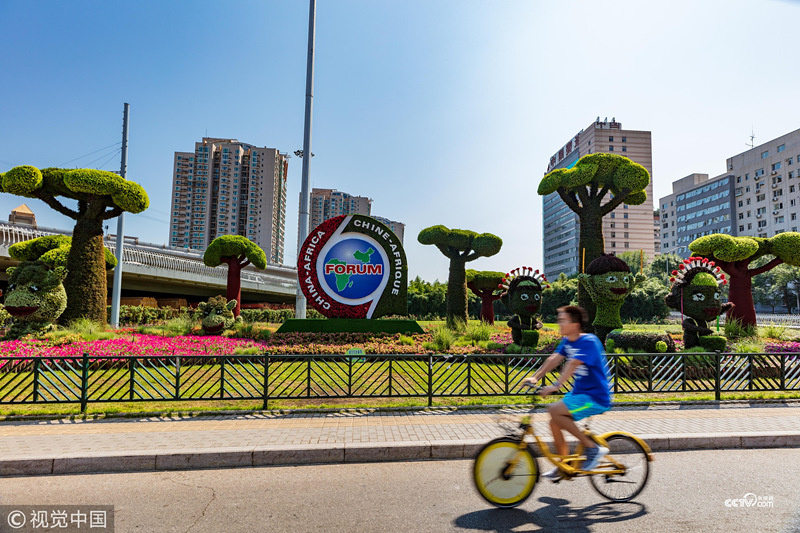By Miroslav Atanasov, Ph.D., Renmin University of China
The 2018 Beijing Summit of the Forum on China-Africa Cooperation (FOCAC) is being held on September 3-4, 2018. African heads of state meet again with the top Chinese leadership to discuss mutual partnership exchanges.

At the Johannesburg Summit in South Africa in December 2015, industrialization was given priority among the areas of Chinese assistance. Chinese President Xi Jinping announced that 10 billion USD will be allocated for helping African countries achieve industrialization – a significant portion of the total 60 billion USD three-year package of China’s aid to Africa. That was considered the most important measure, since African economies are desperate in their desire for economic development. They want to secure employment for their vibrant populations, increase consumer demand and thus reduce social tensions.
The European colonial policies prioritized the grabbing of natural resources and never attempted to industrialize Africa. African economies have been overly dependent on commodity exports, but price fluctuations are a constant cause of financial instability. Africa has advanced in other fields but lags far behind in industrial output; the continent’s total global manufacturing share has stood at about 4 % and it is mostly excluded from global value-chains.
So China’s assistance is timely and identifies an important niche. It also helps Beijing move toward more capital-intensive processes and high-tech products, while outsourcing millions of lower-end manufacturing jobs elsewhere. It’s a win-win scenario. The recent inclusion of Africa in the Belt and Road Initiative has made this opportunity more practical and financially feasible.
Immediately after Johannesburg, Beijing moved to make good on their pledge. In January 2016, the China-Africa Industrial Cooperation Fund was launched. There have been challenges, such as local regulations and adequate personnel, but China has helped to tackle them. One problem is local infrastructure, but Beijing remains committed to assist African countries upgrade their transportation and construct modern highways, airports, and high-speed railways.
Since the last FOCAC meeting:
1.The first phase of the Mombasa–Nairobi Standard Gauge Railway in Kenya was completed by China Road and Bridge Corporation. It is also called, "The Madaraka Express" opened on June 1, 2017 and daily carries passengers and cargo between Kenya’s capital and the Indian Ocean. It is 485 km long, the most expensive national infrastructure project since independence, and provided jobs for over 25,000 Kenyans.
2.The Addis Ababa-Djibouti Railway was completed and opened on January 1, 2018. Two Chinese companies will operate it until 2024 when it will be turned over to the Ethio-Djibouti Standard Gauge Railway Transport Company. With a length of 759 km it has employed thousands of locals and daily carries passengers and freight between Ethiopia’s Capital and the Port of Doraleh, Djibouti.
Now Chinese companies are “going global” and Africa is one of their key destinations. China’s investments are building industrial parks, establishing trade cooperation zones, helping educate thousands of African specialists, and transforming the continent. Here are a few examples:
1.Nigeria. In the community of Utesi, Edo State, Time Ceramics Limited, opened up operations by employing 500 local youth. They plan to reach greater capacity with 2,000 employees. Chinese investments have also improved the road infrastructure in the area, provided modern equipment to the local hospital, and will assist in the construction of a school for factory workers’ children.
2.Kenya. In December 2017, Chinese investors signed an agreement for construction of the first fish-processing factory in Kisumu. The plant will supply fish for both Kenyan domestic and international markets, boost local economy and provide jobs for hundreds of youths.
3.Tanzania. In the coastal city of Tanga, Sinoma Company is constructing the largest cement factory in East Africa to meet both local demands and exports. The 1 billion USD investment will be a catalyst to the country’s industrialization and socioeconomic development.
4.Uganda. In the north of the country China is building a 1.4 billion USD underground hydro power plant – the first of its kind in Africa. The project is employing 4,000 youths regardless of their skill levels; they learn valuable job skills for life and many get much-needed financing for their future education to fulfil their dreams.
Other examples are Hisense Electronics in South Africa, CITIC’s real estate development in Angola, and hundreds more – too numerous to list.
Massive Chinese investments remains ongoing in Ethiopia, which is becoming the African hub of lower-end goods production. In the town of Dukem, China opened the first industrial park. Huajian, a Chinese shoemaker, has outsourced much of its production here; they have opened two factories, produce 5 million pairs of top brand shoes per year, bring about 32 million USD to the country in annual earnings, and provide jobs to over 7,000 Ethiopians.
The Huajian factory changes the lives of many youth. One such person is 27-year old Demis Degev who graduated from Addis Ababa University with a degree in clinical nursing in 2012, but couldn’t find a job. He joined Huajian and learned shoe-making. Soon his education got him promoted to team-leader. Later he was sent to Dongguan city in China for further training; there he listened to online Chinese conversations nightly. Upon graduation he was fluent in Chinese and ranked top among his peers. Now, Degev is back in Ethiopia working as a manager and making 20 times more money than he did 5 years ago.
Another 500 Ethiopian youth will be sent to China for Huajian managerial training. One of Devev’s colleagues is 27-year old Esrael Etefa, with Chinese name "Fazhan," or “development.” She says: I like the name because of its meaning. The company provides a platform for many of our people to develop ourselves." Etefa also says working for Huajian helps improve local work ethics, which could maximize local labor potential.
The quick success of Huajian shows that the Chinese recipe works in other developing countries. Similar industrial parks have been built by China in Zambia, Egypt, and Nigeria with many more in the making.
Many hope the FOCAC Beijing summit will take new steps in improving cooperation. Undoubtedly, this marvelous global partnership has been of great help to Africa’s development, improved millions of ordinary lives and given them hope for a better future.
(The opinions expressed here do not necessarily reflect the opinions of Panview or CCTV.com. )

Panview offers a new window of understanding the world as well as China through the views, opinions, and analysis of experts. We also welcome outside submissions, so feel free to send in your own editorials to "globalopinion@vip.cntv.cn" for consideration.
















